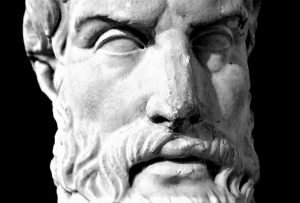Stoicism
Stoicism is an ancient Greek philosophy, which was developed by Zenon of Cythus around 300 B.C. as a refinement of cynicism, which teaches the development of self-control and strength as a means of overcoming destructive emotions. It does not seek to extinguish emotions completely but seeks to transform them through voluntary abstinence from worldly pleasures, which allows a person to develop clear judgment, inner calm, and freedom from suffering, which is considered the ultimate goal.
What is Stoicism?
A philosophical doctrine that studied how to master the passions that affect life with virtue and reason and whose objective was to attain happiness and wisdom without needing material goods and fortune.
About Stoicism
As an ethical doctrine, it consists of seeking a way to free oneself from passion, anguish or suffering through the constant search for reason and apathy. It teaches indifference and a “passive” reaction to external events because it considers that nothing external can be good or bad, and that equanimity towards the ups and downs of life is of paramount importance.
History
It was founded in Athens by Zenon of Citio and was influenced by Socrates and the Cynics. Stoicism moved to Rome, where it flourished during the Empire period, but at the same time was persecuted by emperors who did not like it and openly accepted by emperors who tried to live off it, such as Marcus Aurelius. It was a doctrine that influenced Christianity, as well as several important philosophical figures throughout the ages, and early in the twenty-first century there was a rebirth as a practical philosophy associated with Cognitive Behavioral Therapy and similar approaches.
Of course, Stoicism originated as a modification of existing schools of thought, and its influence extended far beyond the formal closure of the old philosophical schools by the Byzantine emperor Justinian I.
There are three phases in its history:
- The early Stoa: it went from Zenon de Cito to the third head of the school, Crísipo.
- The middle Stoa: including Panaetius and Posidonius.
- Roman imperial period, or late Stoa: with Seneca, Musonius Rufus, Epictetus and Marcus Aurelius.
Founder os Stoicism
Zenon of Citio was the founder of Stoicism, he was a Hellenistic thinker probably a descendant of the Phoenicians. His school of Stoic philosophy taught in Athens from about 300 B.C. and was based on the moral ideas of the Cynics. His movement placed great emphasis on goodness and peace of mind acquired by living a life of virtue in accordance with nature. It became very popular and flourished as one of the main schools of philosophy from the Hellenistic period to Roman times.
Characteristics
The most outstanding characteristics of Stoicism are the following:
- Philosophy is more important than religion.
- The security of the individual is sought through doctrine.
- The meaning and purpose of man and the cosmos are two of the most important aspects.
- Man was not seen from the polis.
- Ethics was not considered part of politics.
- The human being is limited by his destiny, which he cannot control.
- The correct conduct of the individual is possible only in the bosom of a calm life avoiding disturbances to the soul.
Principles
The principles of Stoicism are:
- Nature: tells us that nature is always rational.
- The law of reason: the universe is governed by the law of reason. Man cannot escape his strength, but he can deliberately follow the law.
- Virtue: a life directed according to rational nature is virtuous.
- Wisdom: wisdom is the root virtue. From wisdom are born the different cardinal virtues such as vision, courage, self-control and justice.
- Apathy: being irrational passion, life must be a battle against it and intense sensations must be avoided.
- Pleasure: pleasure is not good, but it is not bad in its totality. It is only acceptable if it does not interfere with our quest for virtue.
- Evil: for Stoicism poverty, sickness and death are not evil.
Representatives
The most important representatives of Stoicism are:
- Zenon of Citio
- Ariston of Khios
- Dionysius of Heraclea
- Perseus of Lithium
- Cleansers
- Chryssopus
- Sphere
- Seneca
- Musonius Rufo
- Epictetus
- Marcus Aurelius
Stages
Stoicism was divided into three different periods or stages:
- First Stage: it had a dogmatic It was a trend against epicureism. Its ethical doctrinal background was very similar to cynicism and was complemented with Heraclitus’ Physics and some Aristotelian elements. Its main characteristic was its dogmatic character, represented mainly by Chryssopus, who carried the weight of the controversies against the academics.
- Second Stage: it was known as Middle Stoicism and arose from Diogenes of Babylon, and over Panetium. During this stage Stoicism changed due to the weariness of struggles, to the point that the Stoics simply silence the ontological and logical theses of dogmatic Stoicism in the rigid manner of Chryssopus; and they are limited to issues of an ethical
- Third Stage: known as the epoch of the Roman Empire. In this period the Stoics managed to use different materials of ancient philosophies, in physics they used Aristotelian hylomorphism; in theology they collect the proofs of Plato and Aristotle; and in Ethics they prolong the attitude of the cynics.
Roman Stoicism
Stoicism gained importance in Rome during the transitional period between the last Republic and the Empire, and Cato the Younger became a model for the later Stoics due to his political opposition to the “tyrant” Julius Caesar. Roman Stoicism itself was the last phase of the Stoic period. It is completed by two less notable authors: Heracles and Cleomedes.
Importance
Unlike other philosophical currents, the great importance of Stoicism lies in the importance it attaches to accepting that there are many things in the world that are bad and cannot be avoided, but that the most important thing to remember is that we can always find a way out. It teaches us to avoid living in a utopian world and insists on accepting the world as it is, taking into account all possible negative reactions.
Phrases
The main phrases that can be rescued from Stoicism are the following:
- Great riches, great slavery.
- There are things that are not enough to be known by having learned them. It was greed that created poverty, and by ambitiously losing everything, he lost everything.
- Here is a great thing: to have the weakness of a man, and the security of a god.
- Today can happen what can happen any day.
- Nothing gives us such respectable dignity, nor independence as important as not spending more than we earn.
- Death is very heartfelt when the father is alive.
- Friendship is always profitable, but love is sometimes harmful.
- Greed is like flame; whose violence increases in proportion to the fire that produces it.
Books about Stoicism
Some books that we can consult and read that will provide us with information about Stoicism are the following:
- Stoic philosophy.
- The Stoics.
- A Manual of Life.
- Letters to Lucilio.
- The formula of happiness: self-control or scatter?
- About life according to nature
- The universal.
- Dialectical arguments and Passions.
Examples
Some examples of Stoicism are the following:
- “These were difficult times, but the citizens stoically endured the difficulties”. What it says is that in response to certain difficulties, citizens did not indulge in regrets or sadness, but went on to maintain a firm state of mind.”
- “The rival goalkeeper conceded ten goals but maintained a stoic countenance”. We are saying that despite the hard blow of conceding ten goals, the goalkeeper showed no signs of discomfort or anger, but stood firm.”
How to cite this article?
Briceño V., Gabriela. (2019). Stoicism. Recovered on 23 February, 2024, de Euston96: https://www.euston96.com/en/stoicism/










